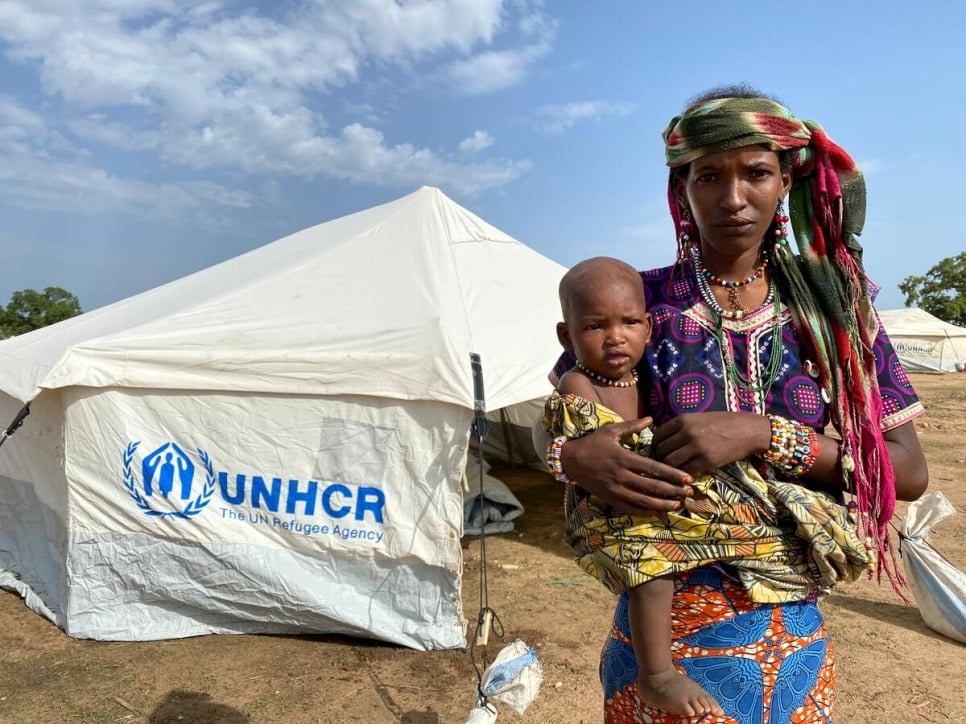
Refugees from the Central African Republic and South Sudan receive emergency shelters in El Radoum camp in South Darfur, Sudan. © UNHCR:Behrooz Taleb
GENEVA – Governments pledged US$ 1.13 billion today to provide help and a lifeline to people displaced from their homes by war, violence and human rights violations, supporting the work of UNHCR, the UN Refugee Agency, in 2023. Along with a commitment of US$ 400 million from UNHCR’s private sector National Partners, the total amount announced is US$ 1.53 billion.
These commitments mean that UNHCR will start 2023 with the confidence it can cover 15 per cent of anticipated needs for the year.
The United States provided UNHCR with a record US$ 2.1 billion in 2022, and led the pledges with a US$ 200 million commitment, followed by Germany and Japan. In response to UNHCR’s appeal for more flexible funding that enables agility in an emergency and allows UNHCR to address underfunded situations, the governments of Sweden, Denmark, Norway and The Netherlands set a positive example.
“As a result of conflict, the climate emergency, and other crises, a record number of displaced people around the world face unprecedented needs,” said Filippo Grandi, UN High Commissioner for Refugees. “Fortunately, UNHCR’s generous donors continue to support them during these dire days, creating hope for a brighter future.”
UNHCR asked donors for US$ 10.211 billion in 2023, the first time it projected over $10 billion in needs at the start of a year. As new conflicts arise and others go unresolved, there are now more than 100 million forcibly displaced people, the highest number ever recorded. UNHCR programmes support the forcibly displaced, as well as the governments and communities that host them, by promoting their empowerment and inclusion, helping to resolve their situations, and making them less dependent on humanitarian aid.
“I was distressed by the cuts we were forced to make this year to lifesaving programmes as funding felt short of needs,” Grandi said. “We are living in turbulent times. Unresolved conflicts, rising prices, and more damaging climate events are piling pressure onto the most vulnerable. The funding announced today will help alleviate some of the hardship, but much more is needed throughout the year.”
Governments attending the conference also pledged US$ 721 million for 2024 and beyond, a crucial contribution to the planning and stability of UNHCR’s longer-term support programmes.
Grandi highlighted that he was “heartened by the outpouring of support from the public in so many countries for UNHCR’s work in Ukraine and beyond.” Private sector National Partners support UNHCR in Argentina, Australia, Germany, Japan, Spain, Sweden, Switzerland, United Kingdom and the United States.
Notes to the editor:
UNHCR’s Global Appeal 2023 sets out the challenges that UNHCR foresees in 2023 and the plans it has made to tackle them. It includes a foreword from the High Commissioner, chapters on funding, and UNHCR’s work in different regions and in 16 major thematic areas. It also includes interviews with senior UNHCR staff on internal displacement, statelessness, climate action and UNHCR’s work with development partners. It covers operations in 134 countries and territories. It seeks funding for activities including child protection, emergency preparedness and relief items, cash assistance, health and food security, preventing and responding to gender-based violence, water and sanitation, nutrition support, shelter, education, livelihoods, clean energy and environmental protection.
The response to the situations in Ukraine and Afghanistan and many other evolving and protracted crises means that UNHCR’s 2023 budget is 13.5 percent higher than the original 2022 budget of $8.994 billion. The latter increased during the course of the year when UNHCR issued supplementary appeals – notably for Ukraine – and 2022 budgetary needs currently stand at $10.714 billion. Although donors have repeatedly raised the level of their contributions in recent years, the global needs have risen faster, and the 2022 budget was only 52 per cent funded at the start of December.
Share on Facebook Share on Twitter